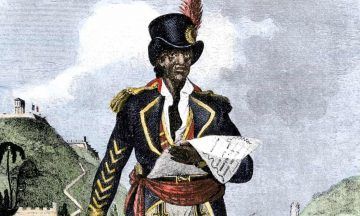Ian Thomson in The Guardian:
 On January 1804, the West Indian island of Saint-Domingue became the world’s first black republic. The Africans toiling on the sugar-rich plantations overthrew their French masters and declared independence. The name Saint-Domingue was replaced by the aboriginal Taíno Indian word Haiti (meaning “mountainous land”) and the Haitian flag created when the white band was ceremonially ripped from the French tricolour. Two hundred years on, Haiti’s is the only successful slave revolution in history. It was led by Toussaint Louverture, a Haitian former slave and emblem of slavery’s hoped-for abolition throughout the Americas.
On January 1804, the West Indian island of Saint-Domingue became the world’s first black republic. The Africans toiling on the sugar-rich plantations overthrew their French masters and declared independence. The name Saint-Domingue was replaced by the aboriginal Taíno Indian word Haiti (meaning “mountainous land”) and the Haitian flag created when the white band was ceremonially ripped from the French tricolour. Two hundred years on, Haiti’s is the only successful slave revolution in history. It was led by Toussaint Louverture, a Haitian former slave and emblem of slavery’s hoped-for abolition throughout the Americas.
This superb new history of Louverture and his legacy portrays Saint-Domingue as the most profitable slave colony the world had ever known. The glittering prosperity of Nantes and Bordeaux, Marseilles and Dieppe, derived from commerce with the Caribbean island in coffee, indigo, cocoa and cotton; Saint- Domingue’s sugar plantations alone produced more cane than all the British West Indian islands together.
More here.
